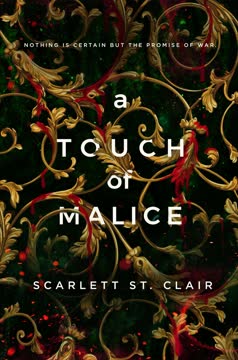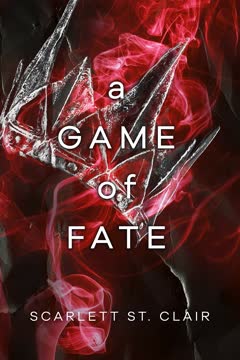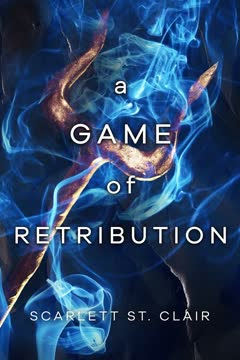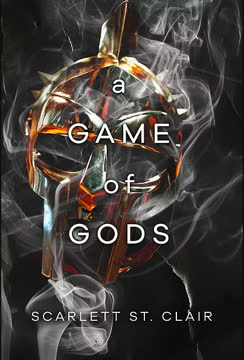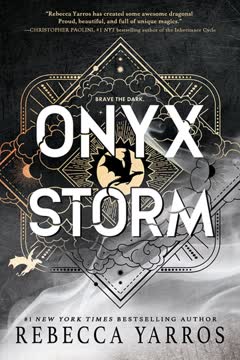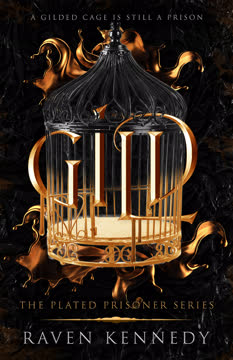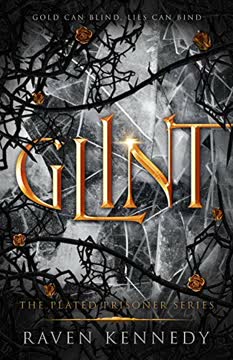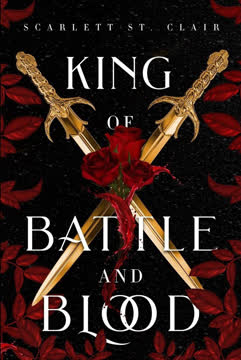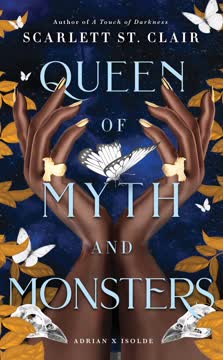Plot Summary
Nightmares and Wounds
Perséphone is tormented by recurring nightmares of her abduction and assault by Pirithoos, a trauma that lingers even in the safety of Hadès' arms. The couple's intimacy is shadowed by guilt, rage, and the struggle to heal. Hadès, burdened by his own sense of failure to protect her, tries to help Perséphone reclaim control, but both are haunted by the violence of the past. Their love is passionate but fraught, as Perséphone's wounds—both physical and emotional—refuse to close, and the specter of vengeance and self-doubt threatens to consume them both.
Grief's Lingering Shadow
Perséphone's grief over Lexa's death is a constant ache, coloring her every joy with sorrow. Lexa's presence lingers in the afterlife, changed and distant, a reminder that some wounds never fully heal. As Perséphone tries to plan her wedding, she is confronted by the emptiness left by her friend's absence and the guilt of not being able to save her. The world expects her to move forward, but the past clings tightly, and Perséphone must learn to live with the pieces of herself that grief has broken.
Brewing Mortal Unrest
The mortal world is restless, chafing under divine rule. A brutal winter—Déméter's wrath—paralyzes the land, and mortals begin to blame the gods for their suffering. The Triade, a mortal resistance group, grows bolder, targeting those favored by the gods. Perséphone herself becomes a target of public scorn and violence, as the line between divine and mortal blurs. The gods' indifference and the mortals' desperation set the stage for a conflict that threatens to engulf both worlds.
Games and Tensions
At a housewarming party, Perséphone's circle of friends—gods, mortals, and nymphs—gather, but tensions simmer beneath the surface. Games reveal secrets and insecurities, especially between Perséphone and Hadès, whose past lovers and experiences stir jealousy and vulnerability. The group's dynamic is further strained by the presence of outsiders and the ever-present threat of violence from the mortal world. Even moments of levity are tinged with anxiety, as everyone senses that peace is fragile and fleeting.
Ancient Magic Awakened
Training with Hécate, Perséphone begins to unlock the depths of her magic, learning to heal and to wield life and death. But her power is volatile, tied to her emotions and trauma. The world's escalating violence demands that she master her abilities quickly, as new threats—relics capable of harming gods, and mortals emboldened by divine weakness—emerge. Perséphone's struggle to control her magic mirrors her struggle to control her fate, as she is forced to confront the darkness within herself.
The Price of Power
Perséphone and Hadès grapple with the morality of vengeance. When Perséphone tortures her attacker in Tartarus, she is left hollow, questioning whether justice can ever truly heal. The gods' punishments are revealed to be as cruel as the crimes they avenge, and Perséphone fears becoming like those she despises. The cost of power is steep, and every act of retribution leaves a scar on her soul, threatening to turn her into another monster in the endless cycle of divine violence.
Harm and Vengeance
Harmonie, Aphrodite's sister, is savagely assaulted by masked mortals wielding relics that nullify her powers. The attack is a message: the gods are vulnerable, and their enemies are growing bolder. Aphrodite demands vengeance, but Hadès counsels caution, fearing that rash action will only play into their enemies' hands. The gods are forced to reckon with their own mortality and the possibility that the world they have ruled for millennia is slipping from their grasp.
Lines in the Snow
As Déméter's winter tightens its grip, the gods convene to debate how to respond. Some, like Héra and Zeus, see Perséphone's love for Hadès as the root of the world's suffering and demand their separation. Others, like Hermès and Apollon, begin to question the old order. Perséphone refuses to be a pawn, asserting her agency and demanding respect. The council's indecision and infighting reveal the cracks in the Olympian regime, as the threat of open war looms.
The Olympian Council
At a tense council, Zeus demands to know if Perséphone and Hadès' union will produce a child prophesied to surpass even Zeus in power. The Oracle's ambiguous words—"a marriage that will produce a god greater than Zeus"—ignite paranoia. Zeus grants his blessing for the marriage, but with the chilling caveat that any child born of their union will be killed. The gods' fear of change and loss of power drives them to ever more desperate measures, setting the stage for tragedy.
The Club's Dark Secret
Perséphone and her friends infiltrate a secret club, only to witness the public mutilation of the goddess Tyché by mortals wielding ancient relics. The event is a rallying cry for the Triade, who declare war on the gods. The violence is shocking, and Perséphone's own powers erupt in a deadly, uncontrolled burst. The boundaries between victim and perpetrator blur, and the gods realize that their enemies are not only mortals, but also their own kind, corrupted by fear and ambition.
The Avalanche's Toll
Déméter's magic unleashes a catastrophic avalanche, burying entire cities and killing thousands. Perséphone uses her powers to restore life to the land, but she cannot resurrect the dead. The mortals' grief and rage boil over, and Perséphone becomes a scapegoat, attacked in public and blamed for the gods' indifference. The cycle of violence intensifies, as both mortals and gods are driven to desperate acts in the face of overwhelming loss.
The Arsenal's Door
Thésée, leader of the Triade and son of Poséidon, kidnaps Perséphone and her friends, forcing her to open Hadès' legendary arsenal. Déméter, now fully an antagonist, aids Thésée in his quest to seize the gods' most powerful weapons. Perséphone is forced to choose between her own safety and the lives of those she loves, making a devastating sacrifice that will have far-reaching consequences for the fate of gods and mortals alike.
The Labyrinth Below
Trapped in a labyrinth beneath the earth, Hadès battles ancient monsters and his own helplessness. Separated from Perséphone, he is forced to confront the limits of his power and the depth of his love. The labyrinth is both a physical and psychological trial, as Hadès must find a way to escape and reclaim his place as king—and as Perséphone's equal—before it is too late.
The Mother's End
Perséphone and Déméter face each other in a battle that is as much emotional as magical. Déméter, broken by her own trauma and consumed by fear, cannot let go of her daughter. Perséphone, finally embracing her own power and agency, is forced to make an impossible choice. The battle ends with Déméter's death, a victory that feels like a loss, and Perséphone is left to mourn the mother she could never truly have.
The Queen's Ascension
In the aftermath of war and loss, Perséphone is crowned queen of the underworld. Her marriage to Hadès is both a personal triumph and a political act, uniting the realms of life and death. The celebration is bittersweet, as friends and enemies alike gather to witness the dawn of a new era. Perséphone's journey from captive to queen is complete, but the scars of her trials remain, and the future is uncertain.
Chains and Crowns
Even in victory, Perséphone and Hadès must navigate the complexities of their relationship. Old wounds and new fears threaten to drive them apart, but their love endures. Together, they explore the boundaries of trust, desire, and vulnerability, forging a partnership that is both passionate and fraught. The chains that once bound them become symbols of their mutual devotion, and their crowns are both a burden and a blessing.
The Battle for Tomorrow
The theft of the gods' greatest weapons and the release of the Titans signal the start of a new age of conflict. The old order is shattered, and the world stands on the brink of chaos. Perséphone and Hadès, now united as king and queen, must rally their allies and prepare for a battle that will determine the fate of gods and mortals alike. The future is uncertain, but hope endures in the love they share and the power they have claimed.
Love's Lasting Gaze
As the dust settles, Perséphone and Hadès find solace in each other's arms. Their love, forged in suffering and sacrifice, is both a refuge and a source of strength. The world they have known is gone, but together they face the dawn of a new era, ready to shape their own destinies. The story ends not with a final victory, but with the promise of enduring love and the courage to face whatever comes next.
Characters
Perséphone
Perséphone is the heart of the story—a young goddess marked by trauma, loss, and the struggle for agency. Her journey is one of transformation: from a sheltered, uncertain girl to a powerful queen who must make impossible choices. Her relationships—with Hadès, her mother Déméter, and her friends—are fraught with love, guilt, and longing. Perséphone's greatest strength is her compassion, but it is also her greatest vulnerability. She is haunted by grief and self-doubt, yet her determination to protect those she loves drives her to embrace her power, even at great personal cost. Her arc is one of painful growth, as she learns that true strength lies in accepting both her darkness and her light.
Hadès
Hadès is the god of the underworld, a figure of immense power and deep wounds. His love for Perséphone is both his salvation and his greatest fear, as he struggles to protect her from a world that seeks to tear them apart. Hadès is tormented by guilt—over past failures, over his inability to shield Perséphone from harm, and over the violence he is capable of unleashing. He is both a lover and a warrior, a ruler who must balance justice with mercy. His relationship with Perséphone is marked by passion, vulnerability, and the constant threat of loss. Through her, he learns to hope again, but the scars of his past are never far from the surface.
Déméter
Déméter is both a victim and a perpetrator, her actions driven by trauma, fear, and an overwhelming need to protect her daughter. Her love for Perséphone is twisted by pain, leading her to commit acts of cruelty in the name of safety. Déméter's inability to heal from her own wounds makes her both a tragic and terrifying figure. She is the architect of much of the story's suffering, yet her motivations are deeply human. Her final confrontation with Perséphone is a heartbreaking culmination of years of misunderstanding and loss.
Thésée
Thésée, son of Poséidon and leader of the Triade, is a complex antagonist. He is driven by a desire for power and a belief in his own righteousness, but his methods are brutal and self-serving. Thésée is both a revolutionary and a tyrant, willing to sacrifice anyone—including Perséphone and her friends—to achieve his goals. His charm masks a deep cruelty, and his actions set in motion the story's most devastating events.
Hécate
Hécate is the goddess of magic and Perséphone's most important teacher. She is wise, powerful, and often inscrutable, guiding Perséphone through the labyrinth of her own abilities and traumas. Hécate's methods are harsh, forcing Perséphone to confront her fears and embrace her darkness. She is both nurturing and ruthless, embodying the duality of magic itself. Her loyalty to Perséphone is unwavering, but she is not afraid to push her to the brink in the name of growth.
Aphrodite
Aphrodite is a goddess marked by loss and rage. The attack on her sister Harmonie shatters her composure, revealing a depth of emotion and a capacity for violence that surprises even her. Her demand for vengeance drives much of the story's conflict, and her willingness to cross lines in pursuit of justice makes her both a powerful ally and a dangerous foe. Aphrodite's relationships—with her family, her lovers, and herself—are fraught with longing and pain.
Sybil
Sybil is Perséphone's mortal friend and confidante, a former oracle who becomes a target in the war between gods and mortals. Her kidnapping and torture are a catalyst for Perséphone's most difficult choices. Sybil's resilience and loyalty are unwavering, even in the face of unimaginable suffering. She represents the vulnerability of mortals in a world ruled by capricious gods, and her fate is a constant reminder of what is at stake.
Harmonie
Harmonie, Aphrodite's sister, is a gentle goddess whose brutal assault becomes a rallying point for both gods and mortals. Her suffering exposes the vulnerability of the divine and the cruelty of those who seek power at any cost. Harmonie's recovery and her relationship with Sybil offer a glimmer of hope in a world otherwise consumed by violence and revenge.
Hermès
Hermès is the messenger god, a figure of wit, charm, and unexpected depth. He is both comic relief and a source of wisdom, guiding Perséphone through the complexities of divine politics and mortal affairs. His loyalty to Perséphone is tested by the demands of the gods, but he remains a steadfast ally, willing to risk everything for his friends.
Lexa
Lexa's death is the wound that never heals for Perséphone. Her presence in the afterlife is a constant reminder of what has been lost and what cannot be regained. Lexa's memory shapes Perséphone's choices, driving her to protect others and to seek meaning in suffering. She is both a symbol of grief and a beacon of hope, reminding Perséphone that love endures even in the face of death.
Plot Devices
Trauma as Catalyst
The story uses trauma—both individual and societal—as the engine of character growth and plot escalation. Perséphone's nightmares, Déméter's unresolved pain, and the mortals' suffering under divine rule all serve to push characters toward change, for better or worse. The narrative structure mirrors this, with cycles of violence and healing, loss and renewal, shaping the emotional arc.
Relics and Ancient Magic
The introduction of ancient relics—artifacts imbued with the power to harm even gods—serves as a key plot device, leveling the playing field between mortals and immortals. These objects are both symbols of the past's unresolved violence and tools for present-day revolution. Their use foreshadows the collapse of the old order and the rise of new powers.
Prophecy and Foreshadowing
The Oracle's ambiguous prophecy about Perséphone and Hadès' union drives much of the gods' paranoia and the story's tension. Foreshadowing is woven throughout, with dreams, omens, and warnings hinting at betrayals, deaths, and the coming war. The narrative uses these devices to build suspense and to explore the limits of fate and free will.
Cycles of Power and Rebellion
The story draws on the mythic cycle of rebellion—Titans overthrown by Olympians, now Olympians threatened by mortals and their own children. This cyclical structure is mirrored in the characters' personal journeys, as they struggle to break free from the patterns of the past. The release of the Titans at the end signals that the cycle is not yet broken, and that new battles—and new possibilities—await.
Duality and Transformation
The narrative is structured around dualities: love and hate, life and death, power and vulnerability. Perséphone's journey is one of embracing both her light and her darkness, learning that true strength comes from integration, not denial. The story's structure—alternating between moments of intimacy and scenes of violence, between personal healing and collective catastrophe—reinforces this theme of transformation through struggle.
Analysis
Scarlett St. Clair's A Touch of Malice is a modern myth that interrogates the nature of power, trauma, and transformation. At its core, the novel is a story about the cost of love and the price of agency in a world where gods and mortals are bound by cycles of violence and desire. Perséphone's journey—from victim to queen, from daughter to sovereign—is both deeply personal and profoundly political. The book explores how trauma, both individual and collective, can be a catalyst for change, but also a source of endless suffering if left unhealed. The gods' fear of change, their desperate clinging to power, and the mortals' rising rebellion mirror contemporary anxieties about authority, justice, and the possibility of renewal. St. Clair's narrative is unflinching in its depiction of pain and loss, but it is also hopeful, insisting that love—however flawed and hard-won—can be a force for healing and rebirth. The novel's lessons are clear: true power lies not in domination, but in vulnerability, compassion, and the courage to break the cycles that bind us. In the end, A Touch of Malice is both a warning and a promise: that even in the darkest of times, new beginnings are possible, if we dare to claim them.
Last updated:
Review Summary
A Touch of Malice received mixed reviews. Many readers found it disappointing compared to previous books, citing excessive sex scenes, lack of plot development, and poor character growth. Critics noted grammar errors and rushed storytelling. Some praised Persephone's character development and the engaging side characters. The book's cliffhanger ending left readers eager for the next installment. While some enjoyed the steamy romance and mythology elements, others felt the series had lost its initial charm. Overall, opinions were divided on this third entry in the Hades x Persephone saga.
Hades x Persephone Reading Order Series
Similar Books
Download PDF
Download EPUB
.epub digital book format is ideal for reading ebooks on phones, tablets, and e-readers.
